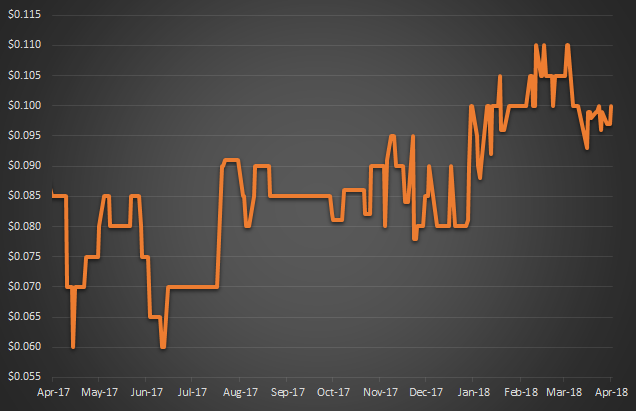Invitrocue - this Singapore company can predict cancer treatment outcomes

Pitt Street Research and NDF Research
Last week I published a report on a great Life Sciences company out of Singapore called Invitrocue. Singapore is one of the finest places a global traveler could find to do Life Sciences, ranking probably the seventh most-productive Life Sciences jurisdiction on the planet in terms of the amount of bio-innovation this City-State of just 5.6 million people can generate. It's got the world's second freest economy after Hong Kong. Its biotech and medical device entrepreneurs get a heck of a lot of public policy support. Its hospitals are world-class. And the City-State has two of the twenty best universities you can find anywhere in the world - Nanyang Technological University and the National University of Singapore (NUS). So Invitrocue, whose technology originated from the mighty A*STAR, had a lot going for it when it was started up in 2012. That, however, isn't why I like it.
The reason to like Invitrocue is that this company may just have come up with one of the more effective cancer treatment prediction engines yet invented. We in biotech have been talking about 'personalised medicine' in cancer, where treatments are tailored specifically for each patient, for a long time. After doing my research on Invitrocue I can report to you that this approach to treating cancer is mainstreaming. Indeed, it has been doing so for the best part of six years now. And Invitrocue is a player in this space thanks to an innovative tool now being used commercially called the 'Onco-PDO'.
In my report I spend a lot of time talking about the origins of Invitrocue as a company with new approaches for '3D cell culture' , where scientists can take cells from a particular tissue and grow them in a test tube in 'three dimensions' rather than two. 3D cell culture means that what scientists learn from test tubes can more reliably reflect what goes in in the reality of an organ than the old two dimensional cell cultures they traditionally used. There's a danger, however, if you're looking into Invitrocue, to get bogged down in the company's technical origins. If you start to feel bored reading my report, I encourage you to jump ahead to the really good stuff, which discusses what Invitrocue has achieved with its 3D cell culture technology in the cancer space. This company - get this - has figured out how to take a sample of a patient's tumour and grow those cancer cells in three dimensions. The result is 'Patient-Derived Organoids' (PDOs) that the published papers are saying are pretty good avatars for the tumours they are modeling. That's dynamite because, with these easy-to-obtain PDOs, oncologists can now test multiple drug and drug combinations via high-throughput screening in 96-well plates, and thereby find out works best for that patient's particular tumour. In my report I cite the case of 'Patient HN137', a patient with head and neck cancer for whom Onco-PDOs suggested the right (and somewhat left-field) drug to use, and did so very quickly. The tumour regression that followed was strong.
That personalised medicine is now mainstreaming in cancer is suggested by the current success of American companies such as Myriad Genetics, Foundation Medicine and Genomic Health, all capitalised in the billions. The high speed and low cost with which a sequence of DNA from a cancer cell can now be read and analysed means that these and other companies as well as academic and hospital groups are getting better and better at identifying the individual signatures of each patient's cancer and devising the right kind of treatments. What I like about Invitrocue and its Onco-PDOs is that, like the cancer genomics players, its technology is fast and low cost. In addition, I think Invitrocue has certain advantages over the genomics companies in that its technology allows functional analysis of the whole tumour vis-a-vis drugs that could act against that function, rather than just enabling analysis of individual oncogenes. With Invitrocue now screening commercial patients with its technology as of this month (that's right, it is in the early stages of building a real business), I expect that data on the effectiveness of Onco-PDOs will continue to build and attract a following from the same kind of oncologists that have helped make Foundation Medicine a US$2.7bn company.
Here's another thing to like about Invitrocue - it's leadership knows that doing Life Sciences start-ups is hard work. If you click here you can view a video interview with CEO Dr Steven Fang about his company where he tells the viewers that in start-ups, 'Mistakes will happen. Things will fail. That is a given. There is no such thing as getting it right the first time around. Failure is a necessary part of being successful'. It's rare to see Life Sciences CEOs speaking this candidly about their daily work. Having said that, I think that Invitrocue has gotten past most of the early mistakes for its 3D cell culture technology, and is now moving on to the 'success' part of the story with Onco-PDO. You can check out why by downloading a copy of NDF Research's initiation report. Just click here, or visit ndfresearch.com. Please note - the usual disclaimers apply - click here.
2 topics
1 stock mentioned

I am an equity research professional who worked in stockbroking from 2001 to 2015. After 15 months doing investor relations I returned to equity research with the founding of NDF Research. With Marc Kennis I founded Pitt Street Research in July 2018.
Expertise

I am an equity research professional who worked in stockbroking from 2001 to 2015. After 15 months doing investor relations I returned to equity research with the founding of NDF Research. With Marc Kennis I founded Pitt Street Research in July 2018.

